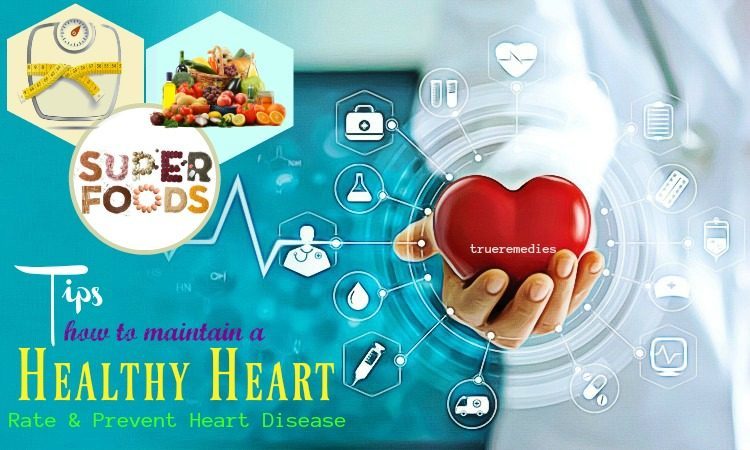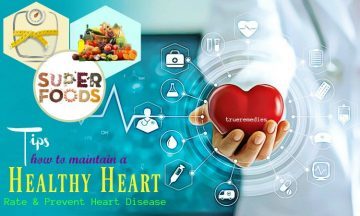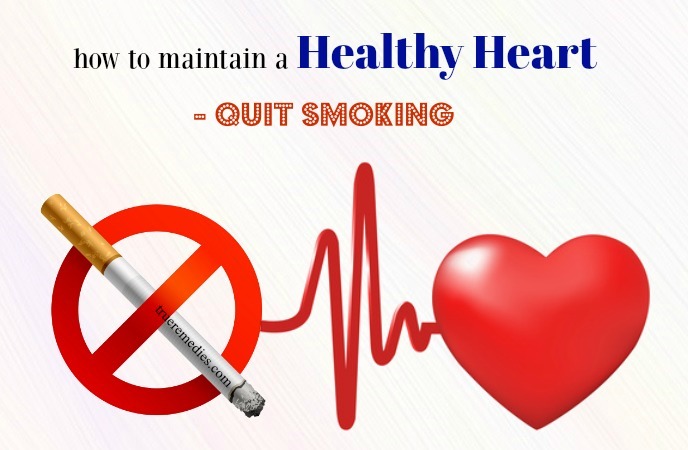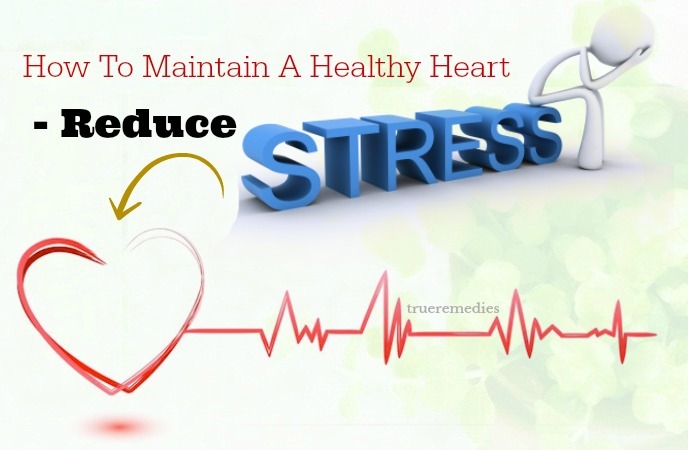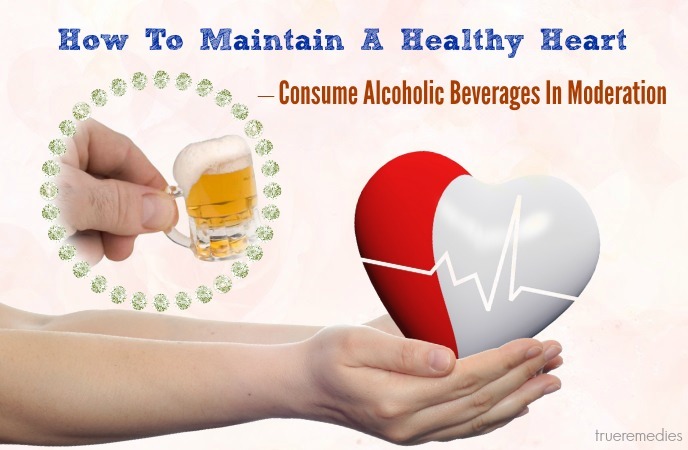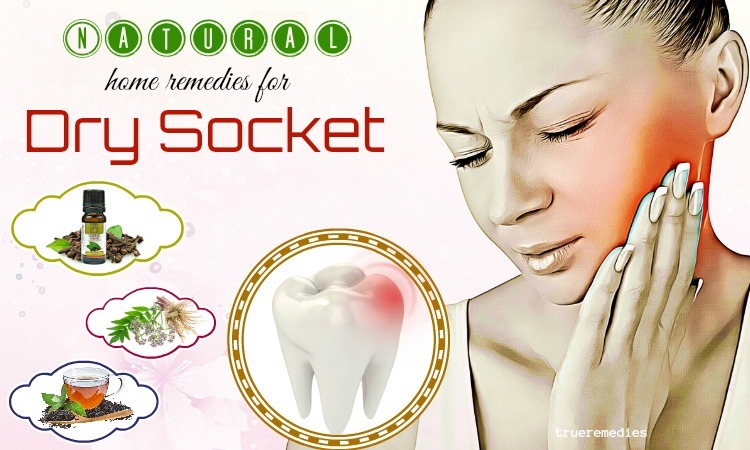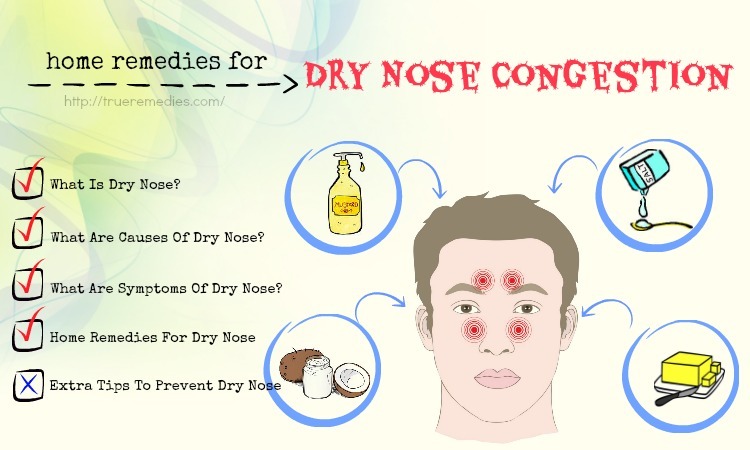Contents
Healthy lifestyle is important for maintaining a healthy heart. The heart is an important organ which transports nutrients throughout the body. Just like any muscle in the body, cardiovascular health needs to be maintained through proper exercise. Maintaining a healthy heart means limiting the habits which negatively affect heart health. For some people, this can be a significant change in many aspects of their life. Minimizing some of the risk factors to improve heart health also has many benefits. This article will give you tips to help you maintain a healthy heart to prevent heart disease. But first, we need to find out some important information below.
What Is A Healthy Heart?
Heart is an important part of the human body. Heart helps to circulate blood and oxygen around the body parts. Heart rate is the number of times the heart beats per minute. Determination of heart rate is considered to be an effective way of predicting our health. In men and women, the higher the heart rate, the higher the risk of death from a heart attack. Frequent heart rate check is a way to protect your life.
You can calculate your own heart rate. Sit down and keep calm for a few minutes. The fluctuation of the heart rate depends on our activity, standing and walking can even make the heart rate increase. So, before measuring the heart rate, your body needs to be relaxed. The ideal time to measure your heart rate is morning, right after you wake up. Do not measure heart rate immediately after exercise, or when you are feeling stress, anxiety or sadness. Then your heart beats fast and you can hardly get accurate results. Do not measure your heart rate while you are drinking coffee or when you are in hot and humid conditions as your heart rate may suddenly rise.
When you feel the body is completely relaxed, start measuring your heart rate as instructed below:
- Use the fingers to catch the pulse: Place the middle and ring fingers on the wrist or under the jaw.
- Push your fingers on the vessels until you feel a strong pulse: Move your fingers around to find the pulse, take a moment and you will feel the pulse.
- Count each beat in one minute: You can count the number of beats in 30 seconds and multiply by two, or count the number of beats in 10 seconds and multiply by six.
You need to measure several times to get the correct number. Normal adult heart rate ranges from 60 to 100 beats per minute, 70 to 100 beats per minute for infants. However, a recent study found that heart rates above 80 are indicative of the risk of obesity and diabetes. For those with a heart rate of between 60 and 80 beats / min, they are healthy people.
What Is An Unhealthy Heart?
If your heart rate is greater than 80 or less than 60, you have an unhealthy heart:
TrueRemedies Partner Solutions

Need a Help from the Leading Expert Online, Available 24/7?
They’re all here and ready to answer your questions online or by phone. Keep asking questions until you get the answer you need.
- Heart Rate Greater Than 80
If your heart rate greater than 80, you are at risk for heart disease. Then you need to consult your doctor immediately. High heart rate means your heart beats fast to maintain a steady level. People with high heart rates are at risk for heart disease, obesity and diabetes. A 10-year clinical study showed that adults who have a heart rate from 70 beats to 85 beats / minute are 90% more likely to die than those who had a heart rate less than 70.
- Heart Rate Less Than 60
When your heart rate less than 60 beats / min, your health is not good. For people with congenital heart rhythms, a heart rate lower than 60 is not an alarm for heart health.
What Are Common Causes Of An Unhealthy Heart?
Here are common causes of this condition:
- Watch TV Too Much
Sitting for hours to watch television increases the risk of heart attack and stroke, whether you have regular exercise. The reason is that sitting for too long can affect the amount of fat and sugar in the blood.
- Depression And Psychological Pressure
If you are feeling depressed, you need to seek treatment quickly because this condition can have a very negative effect on your heart health. You need laughter to replace, especially the timely support from friends and relatives. Talk to someone about the problems you are experiencing, you will feel more comfortable.
- Snore
Snoring can be a sign of serious problems. It is a sleep apnea. This disorder causes breathing disruption in sleep and high blood pressure. More than 18 million adults in the United States suffer from sleep apnea, which increases the risk of heart disease. People who are obese or overweight are more likely to have sleep apnea. If you regularly snore and feel tired when waking up, see your doctor for a test as soon as possible.
- Poor Oral Hygiene
This may sound strange. In fact, scientists have not determined this reason. But there is still a relationship between gum disease and heart disease. Bad oral care regimen causes plaque and food debris are trapped in the teeth. This causes bacteria in the mouth and leads to gum disease. These bacteria trigger inflammation in the body. Meanwhile, inflammation promotes atherosclerosis.
- Drink Too Much Alcohol
Science proves that a bit of beer or alcohol can be good for the heart, but overdoing them will cause serious consequences like obesity and cardiovascular disease.
- Eat Too Much
Overweight is a major risk factor for heart disease. Try to eat modestly and eat fewer foods that contain lots of sugar and grease.
- Smoking
Tobacco is the enemy of the heart. Tobacco smoke blocks the flow of blood to the heart and contributes to the accumulation of plaque in the arteries.
- Do Not Eat Fruits And Vegetables Often
A diet rich in fruits and vegetables is good for the heart. Today, however, many people have a habit of eating a lot of meat and snacks and neglecting vegetables and fruits. This makes the number of patients with cardiovascular disease increased.
What Are Common Symptoms Of An Unhealthy Heart?
Here are common symptoms of this condition:
- Frequently feeling tired
- Feet and hands are swollen abnormally
- Chest pain and dizziness
- Shortness of breath even while resting
- Dyspepsia
- Feeling tired even after walking 5 minutes
- Cardiac dysrhythmia
- Sweat a lot
- The heart beats very strongly frequently
You may experience other symptoms not mentioned. If you have any questions about the signs of the disease, please consult your doctor.
Who Is At High Risk Of An Unhealthy Heart?
People of all ages can develop cardiovascular diseases. However, people who have poor lifestyle (do not regularly exercise and do not eat vegetables and fruits) are at high risk of these diseases [1]. You can control this problem by minimizing risk factors. Please see your doctor for more information.
When To See A Doctor?
Heart is a very important organ. It can affect every other organ in the body. So, once you notice heart problems, you need to see your doctor. Besides, if you have any questions, please consult your doctor. Each person's condition is different, so please consult your doctor to select the most suitable option.
Above are some basic information about a healthy heart. Hopefully with this information, you may have the most comprehensive view of this condition. Here are tips to help youmaintain a healthy heart rate. Please take a look at TrueRemedies.com!
Top 27 Tips On How To Maintain A Healthy Heart Rate And Prevent Heart Disease
1. Quit Smoking
Quitting smoking is the first remedy in this list of tips on how to maintain a healthy heart rate. In the United States, about one in five deaths are caused by tobacco smoke. Tobacco smoke is the leading cause of preventable death in the United States. Tobacco increases the risk of heart damage. Both cigarettes and nicotine contain many chemicals that damage the blood vessels and heart, leading to strong atherosclerosis – the accumulation of cholesterol, fat and calcium in the bloodstream. This can cause narrowed arteries and reduced blood flow.
CO in tobacco smoke is associated with mortality and morbidity. CO impairs oxygen, which causes the heart to supply additional oxygen to compensate. Tightening of blood vessels along with pressure on the heart can cause heart attacks. The only way to stop this pressure on the heart and maintain a healthy heart is to quit smoking.
2. How To Maintain A Healthy Heart – Exercise Daily
This is another must-try treatment in this list of tips on how to maintain a healthy heart rate. Exercise is a way to keep your heart healthy. The American Heart Association recommends:
- Exercise at least 30 minutes of moderate aerobic exercise to support your heart and improve cardiovascular health. Ideally, you should practice 5 times a week for a total of 150 minutes of aerobic exercise.
- Or you can do 25 minutes of intensive aerobic exercise, minimum 3 days per week, a total of 75 minutes.
- You should combine strength training at least 2 days per week with cardio workouts.
- You should restrict your use of motorbikes or cars. Instead, walk or ride a bike.
- Join the intense daily activities. Taking care of your garden and cleaning your home is a great activity for you to do exercise. In addition, activities can be incorporated into daily activities, such as taking stairs instead of taking the elevator, and hiking at lunch break.
- Always maintain healthy work habits. Just start practicing exercises that will make you feel comfortable and gradually increase the difficulty to suit your endurance. Too much exercise can put pressure on the heart and cause back pain. If you have a health problem, talk to your doctor before you start exercising.
Also read: 22 Natural Home Remedies For Palpitations Treatment
3. Monitor Heart Rate When Doing Exercise
You only need to count the pulse at the wrist or at the neck to know your heart rate while exercising. While counting pulse, you have to stop the exercise. Count for 15 seconds and multiply that number by four. When exercising, keep your heart rate between 50% and 85% of the maximum, so if you are below this level, you should increase your heart rate. In addition, you also need to increase the intensity of exercise over time. So you still get more benefits while minimizing the possibility of injury.
4. How To Maintain A Healthy Heart – Maintain A Healthy Weight
This remedy is one of little – known tips on how to maintain a healthy heart rate. Weight gain causes the body to need extra support from the heart to maintain a level of relaxation. This constant pressure causes the heart to over-react and lead to many problems in the future. Exercising and adopting a healthy diet will help you lose weight, thereby reducing the pressure on your heart. Being overweight can increase the risk of heart problems like:
- Coronary Heart Disease
This condition is caused by plaque build-up in the arteries of the heart. Plaque builds up when the arteries narrow and reduce blood flow, thereby reducing oxygen levels throughout the body. In addition, the heart has to work harder to push blood through the narrowed artery, resulting in angina (lack of oxygen from the chest) or even a heart attack.
- High Blood Pressure
If the heart has to pump harder to get the oxygen and nutrients it needs throughout the body, blood vessels and heart can be damaged. The risk of high blood pressure increases significantly if you are overweight or obese.
- Stroke
Plaque that grows in the broken artery can cause a clot. Blood clots formed near the brain can lead to brain ischemia and oxygen, leading to a stroke.
5. Make A Habit Of Monitoring Your Blood Pressure And Cholesterol Levels Regularly
This is the next treatment in this list of tips on how to maintain a healthy heart rate. This helps you keep track of your cardiovascular health and take timely action when any problems occur.
- Check Your Blood Pressure
You should check your blood pressure every two years. If your blood pressure is above 120/80, your doctor may recommend that you check your blood pressure every year (or more, depending on your height, or if you have kidney disease, heart disease, etc.).You can measure your own blood pressure at home. If your blood pressure is above 140/90, you should see a doctor as soon as possible.
- Check Your Cholesterol Level
All men over the age of 34 should have their cholesterol checked every five years. Your doctor will take blood samples and take them to the lab to monitor your cholesterol. Your doctor will explain the meaning of the indicators and the results of your tests. If you have any risk factors that make you more likely to have high cholesterol levels, you should see a doctor to take checks before you are 20 years old. Risk factors include a family history of illness, diabetes or previous cardiovascular disease. Depending on your test results, your doctor may recommend that you monitor your cholesterol more often.
6. How To Maintain A Healthy Heart – Reduce Stress
Stress affects cardiovascular health. Excessive stress causes the body to release hormone cortisol and adrenaline that raise blood pressure and cholesterol. Behaviors due to stress also adversely affect health. These behaviors make you smoke, drink more alcohol, lose control, and become less active. All these behaviors contribute negatively to cardiovascular health. Exercising, changing diets, not smoking, and not drinking alcohol can help reduce stress.
7. Look After Mental Health
This sounds strange when it comes to tips on how to maintain a healthy heart rate, but it works. Certain mental illnesses can lead to cardiovascular harm. You need to control depression and anxiety disorders. These problems may present with symptoms such as overeating, lethargy, lack of energy, stress, high blood pressure, and many other symptoms that affect the heart. If you are diagnosed or you think you have a mental problem, you should see a doctor as soon as possible. Only the doctor can effectively treat mental problems as well as determine the effects of those problems on physical health.
8. How To Maintain A Healthy Heart – Choose Foods Low In Unhealthy Fat
The next one in this list of tips on how to maintain a healthy heart rate and prevent heart disease is eating foods that contain very little fat. Fat which is not good for health includes trans-fats and saturated fats. These fats increase your LDL cholesterol levels – often associated with increased risk of cardiovascular disease. Foods rich in trans-fat include foods made from “partially hydrogenated oils,” such as lard or margarine. Baked goods, fried foods, frozen pizzas and other foods undergoing a variety of treatment processes are often high in trans-fat. Foods high in saturated fat include pizza, cheese, red meat and whole milk products. Coconut oil is high in saturated fats but it also helps increase your cholesterol level so you can use it in moderation.
9. Consume Healthy Fats At A Moderate Level
Polyunsaturated fat, monounsaturated and omega-3 are good for health. These fats help lower LDL cholesterol levels, raise HDL cholesterol levels, reducing the risk of cardiovascular disease. Choose oils like olive oil, canola oil, soybean oil, peanut oil, sunflower oil and corn oil for cooking. Fish is rich in omega-3 fatty acids. Choose fish such as salmon, tuna, mackerel, sardines and herring. You can also add omega-3 from plant sources, such as flaxseeds, vegetable oils, legumes and nuts. However, fats from plants are not efficiently processed by the body.
10. Choose Foods Containing Less Sugar And Refined Carbohydrates
No wonder, this is definitely one that should be mentioned in this list of tips on how to maintain a healthy heart rate. You should limit your consumption of candy, soft drinks, fruit juices and white bread. Instead, choose whole fruits, freshly squeezed juice and whole grain breads. These are all good for the heart.
11. How To Maintain A Healthy Heart – Go For Whole Foods
Whole foods provide balanced nutrition, including healthy carbohydrates, proteins, fats and other nutrients:
- Eat more vegetables and fruits because they are rich in vitamins and minerals. Try to eat lots of fresh vegetables and fruits instead of canned (they usually contain sugar or salt added).
- Choose lean meat, beans and tofu because they are rich in protein.
- Eat whole grains such as bread, pasta from whole wheat, and brown rice [2].
- Eat more organic foods. You can buy them from a natural food store or local produce market. Organic foods do not contain more nutrients than these above foods, but contain little residue from pesticides or food additives. In addition, organic food is also more environmentally friendly.
If price is a problem, you should consider buying only some certain organic foods, such as apples, berries, nuts (peaches, nectarines,…), grapes, celery, bell peppers, potatoes and lettuce. When planted normally, these foods are often sprayed with more pesticides than other agricultural products.
Also read: 25 Tips On How To Improve Blood Circulation In The Body
12. Focus On “Super Food” Good For Heart
This is another must-try treatment in this list of tips on how to maintain a healthy heart rate. Super food is a widely publicized food group believed to be beneficial to health. This term is rarely used by health professionals in the field of nutrition. However, there are many foods that are thought to contain a lot of nutrients and many foods can bring out more benefits than traditional foods. They are:
- Avocado
Avocado is considered as a “super food” because it is rich in monounsaturated fats. Unlike saturated fat, monounsaturated fats are liquid at room temperature and have the potential to lower cholesterol levels. Avocado is also unique because it contains phytosterols that help prevent cholesterol absorption in the body. From there, the body absorbs less cholesterol, lowering blood cholesterol levels [3] [4].
- Pure Olive Oil
Pure olive oil is rich in monounsaturated fats, which helps lower “bad” cholesterol levels. Olive oil also helps in preventing blood clots and stabilizing blood sugar.
- Nuts
Peanuts and seeds from plants such as pecans, pistachios, walnuts, … are rich in plant chemicals, vitamins, fiber, minerals and unsaturated fats.All these substances have been shown to provide significant benefits to the heart by helping to increase high density cholesterol (good cholesterol), lower low density cholesterol (bad cholesterol) and lower blood pressure.
- Quinoa
Quinoa is commonly used in South America. It is rich in protein, vitamins, minerals and fiber.
- Salmon
Salmon is a very good source of protein that contains high levels of omega-3 fatty acids / fish oil proven to support cardiovascular health.
- Oatmeal
Oatmeal is a whole grain cereal which is rich in fiber, so it suppresses the body's absorption of cholesterol. Diet oatmeal brings the most benefit because it needs more time to be digested and it has a low GI. We all know that foods that have low GI levels help prevent hyperglycemia and heart disease. Therefore, oatmeal is very good for heart [5] [6].
- Oranges
Orange is also rich in soluble fiber that helps in reducing cholesterol absorption. Oranges also contain a lot of potassium (helps balance sodium) and vitamin C.
- Bean
Most beans are rich in protein, fiber and minerals. Beans have similar benefits to diet oatmeal, which helps lower cholesterol and blood pressure.
13. How To Maintain A Healthy Heart – Consume Alcoholic Beverages In Moderation
This remedy is one of little – known tips on how to maintain a healthy heart rate. According to the American Heart Association, men are allowed to consume 2 servings of alcoholic beverages, and women are allowed to consume 1 serving of alcoholic beverages each day to protect the heart. Over-consumption will be counterproductive.
If consumed excessively, alcoholic beverages can damage the heart as they contribute to high blood pressure, stroke and obesity. In addition, alcoholic beverages can increase triglyceride levels. Triglycerides are fatty acids that can cause diseases like pancreatitis. Long-term alcohol consumption can lead to irreversible damage to the pancreas (chronic pancreatitis).
14. Use Functional Foods
The next treatment in this list of tips on how to maintain a healthy heart rate is using functional foods. In addition to nutritional supplements from foods, you can use functional foods to compensate for nutritional deficiencies in the diet. Here are some functional foods that you should consider using:
- Vitamins And Minerals
Vitamins and minerals are the proper functional foods that provide vitamin B3 (niacin), vitamin K, vitamin E and magnesium for a healthy heart.
- Herb
Garlic (especially black garlic), Echinacea and ginseng are believed to bring many benefits to the heart.
- Other Functional Foods
Eating fish is good for the heart. But if you do not like fish, you can take omega 3 fatty acids together with coenzyme Q10.
15. How To Maintain A Healthy Heart – Get Enough Sleep
Studies show that people who do not get enough sleep are more likely to be overweight. Adults need to sleep 7-9 hours each night. Young children and adolescents need more sleep. Young children need to sleep 10-14 hours per day, children 7 years old and older need sleep 9-11 hours per day and teens need to sleep 8-10 hour per day. Make sure you always get enough sleep to maintain a healthy heart.
16. Avoid Fast Diet
Avoiding fast diet is another must-try treatment in this list of tips on how to maintain a healthy heart rate. Avoid diets which require you to only drink fluids, take weight loss pills and eat other weight-loss supplements, unless applied under the supervision of a physician. In general, a diet or product that has one of the following is considered as a fast diet:
- Prompts to help lose weight extremely fast (more than 0.5 to 1 kg per week)
- Promises to help lose weight without changing any habit
- Forcing you to spend a lot of money
- Limit your choice of food and do not recommend a balanced diet
17. How To Maintain A Healthy Heart – Reduce Caffeine Consumption
Reducing caffeine consumption is one of little – known tips on how to maintain a healthy heart rate. It is also known that caffeine-containing products such as coffee and tea can increase the heart rate. Drinking more than two cups of coffee a day can contribute to side effects, one of which is an increase in heart rate. If you think your heart rate is high, you should reduce your caffeine intake.
18. Drink Enough Water
The next treatment in this list of tips on how to maintain a healthy heart rate is drinking enough water. Water is essential for the functioning of the body's organs, including the heart. The amount of water you drink every day depends on your weight as well as the activities you perform during the day. However, the average amount of water that each person needs to provide the body is about 2 liters. Make sure your heart never cries for lack of water.
19. Pay Attention To Oral Hygiene
As we mentioned above, although it is hard to believe, oral health also affects the heart. Therefore, you need to pay attention to oral hygiene to ensure a healthy heart. To do this, use floss regularly to remove food particles, brush your teeth at least twice a day, and regularly use mouthwash or diluted saline to clean your mouth. In addition, you should see a dentist every 6 months to check your dental condition.
20. Laugh Out Loud
This sounds irrelevant when it comes to how to maintain a healthy heart, but laughing out loud can do a trick for your heart health. It does not matter if you like cracking jokes with your friends or watching funny movies, laughter can be beneficial for your heart. In accordance with the AHA, research shows that laughing could reduce stress hormones, reduce inflammation in the arteries, and increase the good cholesterol (HDL) levels.
21. How To Maintain A Healthy Heart – Practice Yoga
Yoga can improve your flexibility, balance and strength. It could also allow you to relax and relieve stress at the same time. More importantly, yoga is a potential method to improve heart health. The research published in the Journal of Evidence-Based Complementary and Alternative Medicine shows that yoga exposes potential to alleviate the risk of cardiovascular disease.
22. Reduce Salt Intake
Researchers from the New England Journal of Medicine reported that if the whole U.S population decreased their average intake of salt to ½ teaspoon per day, it may significantly reduce the quantity of people developing coronary heart disease annually.
Actually, salt is among the leading drivers of increasing costs for healthcare in the U.S. Restaurant-prepared or processed foods may be particularly high in salt. Thus, you should think carefully before filling up on your fast-food fix. Use a certain substitute for salt if you have heart failure or high blood pressure.
23. Treat Yourself With Dark Chocolate Bars
Among tips on how to maintain a healthy heart rate, eating chocolate seems little-known. Dark chocolate is a type of chocolate that contains at least 70% cocoa. The fact is, dark chocolate not only tastes good, but it also has heart-healthy flavonoids. Such compounds can reduce inflammation and minimize your risk of heart disease. In spite of being good for the heart, dark chocolate also contains lots of calories and should not be consumed too much. If eaten moderately, dark chocolate (not oversweetened milk type) could be a great treat for your heart.
24. How To Maintain A Healthy Heart – Consider Pet Therapy
Not only do pets offer good company and unconditional love, but they also provide us with a lot of health benefits. Experts from the National Institutes of Health (NIH) show that having a pet might improve your heart health along with lung function. It can reduce the risk of dying from heart disease.
25. Eat Watermelon
It has about 40% more lycopene than in raw tomatoes. A study shows that the human body absorbs this substance at higher levels because of the high water content of watermelon. The great thing is that half a wedge could improve heart-disease prevention by 30%.
26. Consult Your Doctor
This is the last one in this list of tips on how to maintain a healthy heart rate that we want to mention in this article. Some medications that you take may increase your heart rate at rest. The doctor will make the most accurate assessment of the side effects of the drug compared to the benefits it provides. Besides, consult your doctor about your general health, as your heart rate is just one of many measures of cardiovascular health. They need to do more tests to evaluate more accurately.
Maintaining a healthy heart does not mean that you cannot have any fun. Remember that moderation is the key. Making small changes in your life could add up to a huge difference in your heart health, even for children, teenagers and adults.
Above are tips on how to maintain a healthy heart rate and prevent heart disease effectively. They are all very simple and useful and everyone can apply them. So, do not hesitate to apply and share your experience with us.
If you have any contributing ideas about our article of “Top 27 Tips On How To Maintain A Healthy Heart Rate & Prevent Heart Disease” introduced in How To Category, do not hesitate to drop your words below this post. We will answer as soon as we could.

